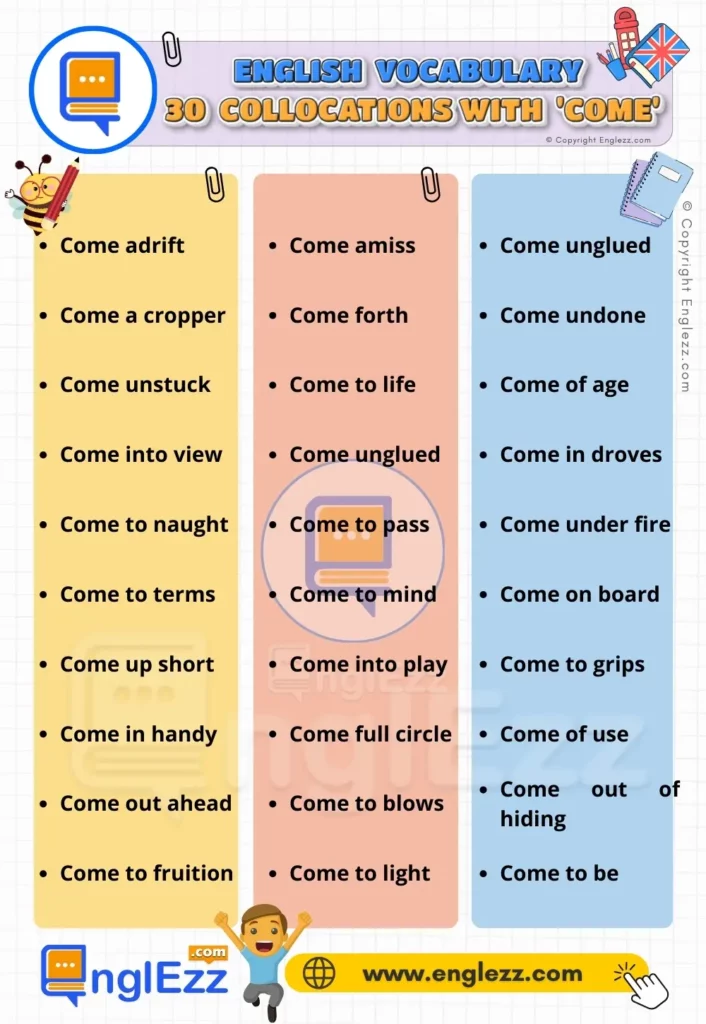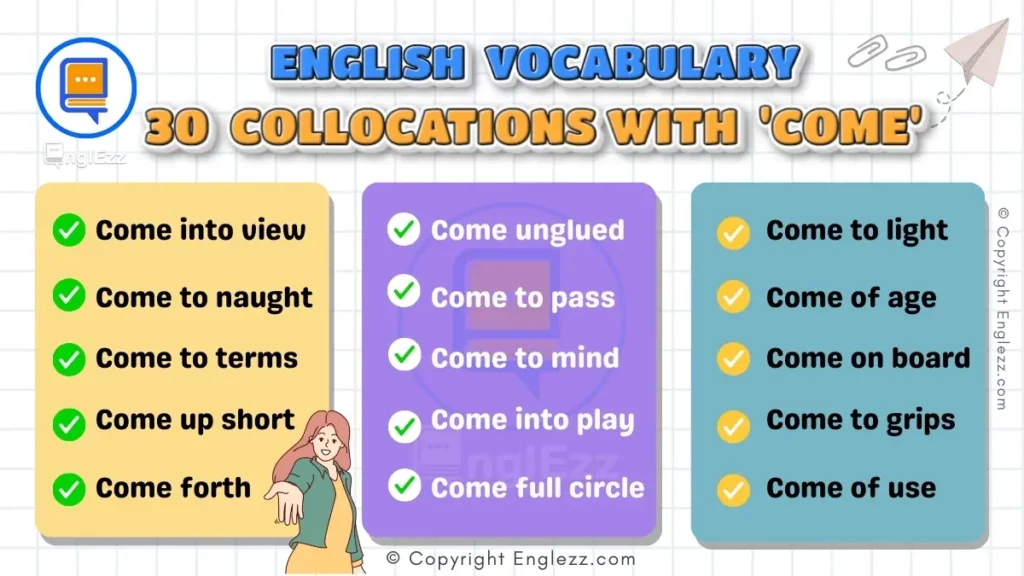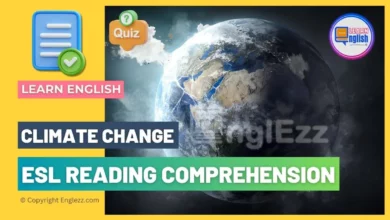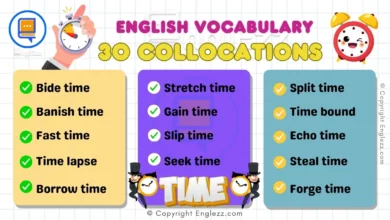Learning collocations is a fantastic way to sound more natural and fluent in English. Collocations are word combinations that are frequently used together, and knowing them can greatly improve your speaking and writing abilities. The verb “come” forms many useful collocations that can be easily incorporated into everyday conversation. In this post, we’ll explore 30 collocations with “come,” providing definitions, phonetic transcriptions, and example sentences for each.
Table of Contents
- Master 30 Common Collocations with Come 👪 for Fluent English
- #1. Come Across 🚶♂️
- #2. Come Up With 💡
- #3. Come Back 🔄
- #4. Come Down 🌧️
- #5. Come In 🚪
- #6. Come Out 🌟
- #7. Come Over 🏠
- #8. Come Up 🌱
- #9. Come Along 🛤️
- #10. Come By 🏠
- #11. Come On 🔛
- #12. Come To 🤔
- #13. Come Through 🚪
- #14. Come Together 🤝
- #15. Come Off 🏅
- #16. Come Forward 👤
- #17. Come Into 🌟
- #18. Come Along With 👫
- #19. Come Under 🔍
- #20. Come Out With 🗣️
- #21. Come Up Against 🆚
- #22. Come By For 🚶♀️
- #23. Come Out Ahead 🥇
- #24. Come Around 🌀
- #25. Come At 🏃♂️
- #26. Come Through With 💸
- #27. Come To Terms With 📝
- #28. Come In Handy 🔧
- #29. Come Alive 🌟
- #30. Come In First 🏆
- Conclusion
Master 30 Common Collocations with Come 👪 for Fluent English
Mastering collocations is essential for anyone looking to improve their English proficiency. Collocations are pairs or groups of words that are commonly used together, and they can significantly enhance your language skills by making your speech and writing more natural. One of the most versatile verbs in English is “come,” and it forms numerous collocations that are frequently used in daily conversations.
In this blog post, we’ll delve into 30 collocations with “come,” providing you with clear definitions, phonetic transcriptions, and practical examples. Whether you’re a student aiming to boost your vocabulary, a professional seeking to refine your language for business communications, or an English language enthusiast wanting to sound more fluent, this comprehensive guide will be immensely helpful. From “come across” to “come up with,” each collocation will be explored in detail to ensure you understand how to use them correctly and effectively.
So, let’s dive in and discover how you can come up with better ways to express yourself in English!
#1. Come Across 🚶♂️
Definition: To find or meet by chance.
Phonetic Transcription: /kʌm əˈkrɔs/
Examples:
- I came across an old friend while shopping in the mall.
- She came across a great book in the library yesterday.
#2. Come Up With 💡
Definition: To think of a plan, idea, or solution.
Phonetic Transcription: /kʌm ʌp wɪð/
Examples:
- We need to come up with a strategy for our marketing campaign.
- He came up with an innovative solution to the problem.
#3. Come Back 🔄
Definition: To return to a place.
Phonetic Transcription: /kʌm bæk/
Examples:
- She plans to come back home for the holidays.
- I’ll come back to the office after lunch.
#4. Come Down 🌧️
Definition: To fall or drop to a lower level.
Phonetic Transcription: /kʌm daʊn/
Examples:
- The rain started to come down heavily.
- Prices have come down significantly this year.
#5. Come In 🚪
Definition: To enter a place.
Phonetic Transcription: /kʌm ɪn/
Examples:
- Please come in and make yourself at home.
- He came in without knocking.
#6. Come Out 🌟
Definition: To appear or become visible.
Phonetic Transcription: /kʌm aʊt/
Examples:
- The sun finally came out after days of rain.
- Her new book will come out next month.
#7. Come Over 🏠
Definition: To visit someone’s house.
Phonetic Transcription: /kʌm ˈoʊvər/
Examples:
- Do you want to come over for dinner tonight?
- He came over to my place to help me with my homework.
#8. Come Up 🌱
Definition: To arise or occur.
Phonetic Transcription: /kʌm ʌp/
Examples:
- A new issue came up during the meeting.
- Opportunities like this don’t come up every day.
#9. Come Along 🛤️
Definition: To accompany or proceed.
Phonetic Transcription: /kʌm əˈlɔŋ/
**Examples:
- Why don’t you come along with us to the party?
- The project is coming along nicely.
#10. Come By 🏠
Definition: To visit or obtain.
Phonetic Transcription: /kʌm baɪ/
Examples:
- You should come by our place sometime.
- Good jobs are hard to come by these days.
#11. Come On 🔛
Definition: To make progress or advance.
Phonetic Transcription: /kʌm ɒn/
Examples:
- The team is really starting to come on this season.
- Come on, we’re going to be late!
#12. Come To 🤔
Definition: To regain consciousness.
Phonetic Transcription: /kʌm tu/
Examples:
- She fainted but quickly came to.
- It took him a few minutes to come to after the accident.

#13. Come Through 🚪
Definition: To succeed or perform as expected.
Phonetic Transcription: /kʌm θru/
Examples:
- He came through with the money he promised.
- Our team always comes through in difficult situations.
#14. Come Together 🤝
Definition: To unite or assemble.
Phonetic Transcription: /kʌm təˈɡɛðər/
Examples:
- The community came together to support the cause.
- The pieces of the puzzle are finally coming together.
#15. Come Off 🏅
Definition: To happen successfully.
Phonetic Transcription: /kʌm ɒf/
Examples:
- The event came off better than expected.
- His plan came off without a hitch.
#16. Come Forward 👤
Definition: To offer help or information.
Phonetic Transcription: /kʌm ˈfɔrwərd/
**Examples:
- Several witnesses came forward to testify.
- She came forward with an important clue.
#17. Come Into 🌟
Definition: To inherit or acquire.
Phonetic Transcription: /kʌm ˈɪntu/
Examples:
- He came into a large sum of money after his grandfather passed away.
- She came into possession of a rare antique.
#18. Come Along With 👫
Definition: To progress or accompany.
Phonetic Transcription: /kʌm əˈlɔŋ wɪð/
Examples:
- Your skills have really come along with practice.
- Come along with us to the park.
#19. Come Under 🔍
Definition: To be subjected to.
Phonetic Transcription: /kʌm ˈʌndər/
Examples:
- The company came under scrutiny for its practices.
- He came under attack from critics.
#20. Come Out With 🗣️
Definition: To say or publish something.
Phonetic Transcription: /kʌm aʊt wɪð/
Examples:
- She came out with a controversial statement.
- The author is coming out with a new book next month.
#21. Come Up Against 🆚
Definition: To face opposition or challenges.
Phonetic Transcription: /kʌm ʌp əˈɡeɪnst/
Examples:
- They came up against strong competition.
- We came up against several obstacles during the project.
#22. Come By For 🚶♀️
Definition: To visit for a short period.
Phonetic Transcription: /kʌm baɪ fɔr/
**Examples:
- She came by for a quick chat.
- Can you come by for a minute?
#23. Come Out Ahead 🥇
Definition: To end up in a better position.
**Phonetic Transcription: /kʌm aʊt əˈhɛd/
Examples:
- He came out ahead in the negotiations.
- Despite the challenges, they came out ahead.
#24. Come Around 🌀
Definition: To change one’s opinion.
Phonetic Transcription: /kʌm əˈraʊnd/
Examples:
- She finally came around to our way of thinking.
- He’ll come around once he sees the benefits.
#25. Come At 🏃♂️
Definition: To approach or attack.
Phonetic Transcription: /kʌm æt/
Examples:
- The dog came at me barking loudly.
- He came at the problem from a different angle.
#26. Come Through With 💸
Definition: To provide what is needed.
Phonetic Transcription: /kʌm θru wɪð/
Examples:
- They came through with the funding we needed.
- She always comes through with good advice.
#27. Come To Terms With 📝
Definition: To accept or deal with.
Phonetic Transcription: /kʌm tu tɜrmz wɪð/
Examples:
- She’s still coming to terms with her loss.
- He came to terms with the fact that he needed help.
#28. Come In Handy 🔧
Definition: To be useful.
Phonetic Transcription: /kʌm ɪn ˈhændi/
Examples:
- This tool will come in handy for fixing the car.
- Extra cash always comes in handy.
#29. Come Alive 🌟
Definition: To become lively or interesting.
Phonetic Transcription: /kʌm əˈlaɪv/
Examples:
- The party came alive after midnight.
- The story really comes alive in the second chapter.
#30. Come In First 🏆
Definition: To win.
Phonetic Transcription: /kʌm ɪn fɜrst/
Examples:
- She came in first in the race.
- Our team came in first at the competition.

Conclusion
Understanding and using collocations can greatly enhance your English language skills, making your speech and writing sound more natural and fluent. The 30 collocations with “come” we’ve explored in this post are just a few examples of how versatile and essential this verb is in everyday communication. By incorporating these collocations into your vocabulary, you’ll be able to express yourself more precisely and effectively.
Practice using these collocations in your daily conversations and writing to become more comfortable with them. Remember, the key to mastering collocations is consistent practice and exposure. Try to come up with your own sentences and use these phrases as often as possible.
By doing so, you’ll find that your ability to communicate in English improves significantly, allowing you to convey your thoughts and ideas more clearly. So, keep practicing, and soon you’ll come to realize how much these collocations can enhance your English proficiency!








